Comments
-
Ukraine Crisis
Quite incredible statistics, actually.For perspective on the use of prisoners, Russia's pre invasion prison population was 420,000. Today it is just 266,000. — Count Timothy von Icarus -
Israel killing civilians in Gaza and the West Bank
When I visited Moscow during the second last year of the Soviet Union a lived with a Muscovite family, the father was Jewish and I remember his passport having as nationality Jewish. So that prevailed I think.One of the influences here is that in Russia there was an emphasis on ethnic identities. — BC -
Israel killing civilians in Gaza and the West BankIn my view, it's quite close that this conflict will enlargen. Iran is using it's proxies. It's like a creeping start.
-
Israel killing civilians in Gaza and the West Bank
I think that @Benkei and actually many others, including Western states do have questions if really Israel's standards are the same as ours. Many countries in the West don't see themselves as "allies" of either party.My understanding is that it is of vital interest for the West to be committed to a system of alliance between countries that share the same standards and treat each other by the same standards. Israel is a valid ally in that sense. — neomac
I question the "vitality" of being an ally here, just as if Iran would be an "existential" threat to the West either.
Switzerland isn't an ally of us. Either the EU or NATO have absolutely no commitments to come into their help on some occasion (which, surrounded by EU member states, would be incredible). If the Swiss would suffer a terrorist attack, many countries would send help if needed. But becoming an "ally" is different. -
Heading into darkness
On the contrary.Why not. It has to be some time. No defunct empire, no lost civilization thought their NOW had come. But it did. — Vera Mont
The idea of "our society" having come to the climax and we've seen the swan song and from here it's just way down is an extremely popular idea! Very popular in the 1970's. Very popular in the 1980's (nuclear war!). And so on. And remember Der Untergang des Abendlandes, Oswald Spenglers famous book about the decline of the West?
That was published 100 years ago. So I guess we have had this "Winter of a Faustian civilization", fall of the West for a century now.
How long have especially Americans had the idea that now their once so great civilization is coming to an end? How long has every scifi-movie done depicted a future that is bleek, unruly with having the society with it's infrastructure having collapsed? Or collapsing. A wonderful film "Soylent Green" (made in 1974) was to happen in 2022. So, is NY like in that picture? We know, because 2022 was last year.
(In 1974, year 2022 was thought to be like this in NY, at least for those worried about ecology.)

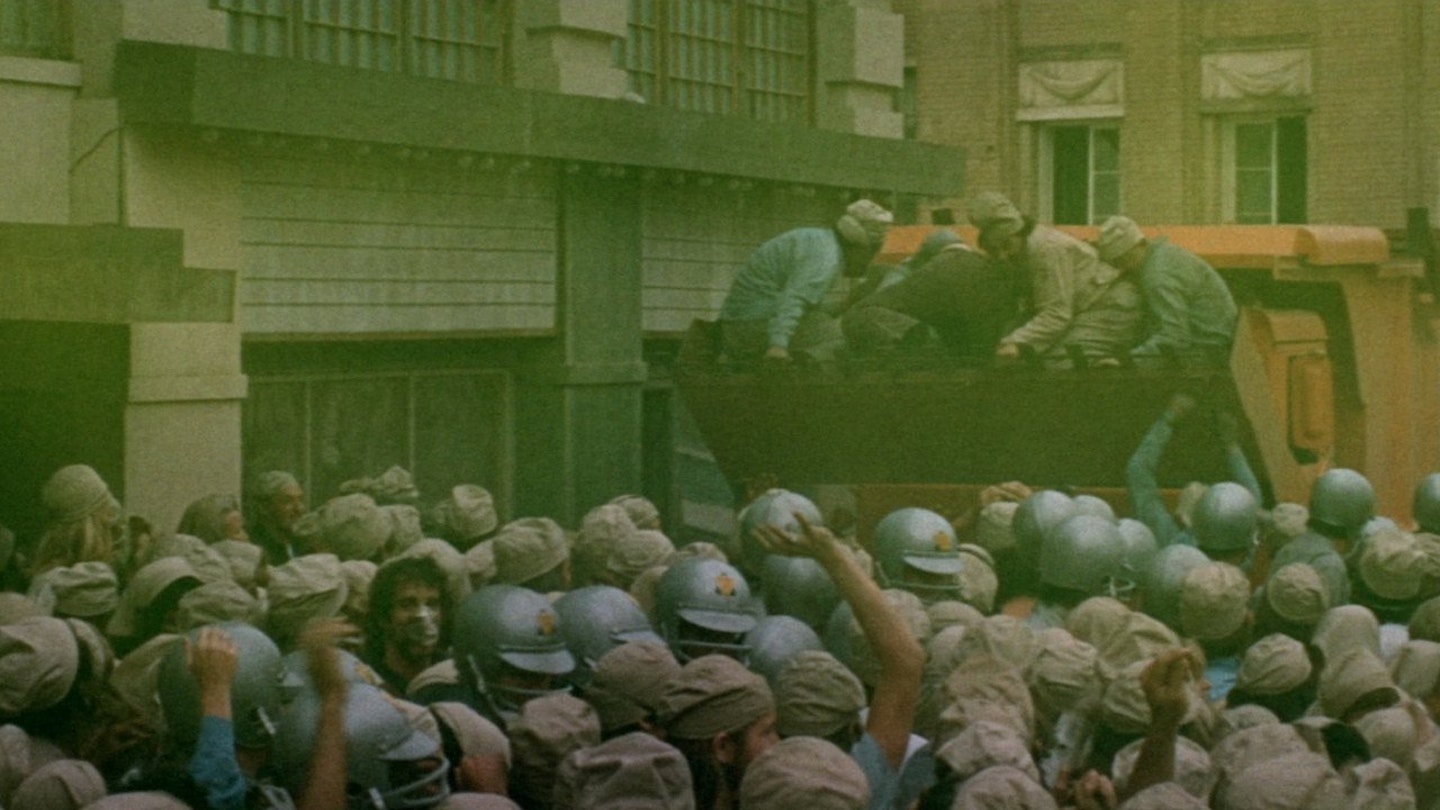

(FYI, the population of New York Metro area is 18,9 million people. In 1974 it was 15,9 million. Here the film writers believed the 1970's very popular population crisis trope.)
Thinking that this is the best it will get and everything is downhill from here is an extremely popular, extremely long-standing idea that has been with us actually for Centuries now, if not longer. People find comfort in it. Ah, the decadent, failing West! Or decadent, failing humanity in general. Before it was because we weren't faithful enough to our religion, now it's a eco-disaster that will wipe out us.
Optimism just looks so naive and silly. And pessimism so deep and full of wisdom. The end is nigh. -
Ukraine Crisis
This is true. One is fighting for survival, one for limited objectives. A small anecdote: when Hamas attacked Israel you had many reports of Israeli reservists flying from abroad to get to their units. Just like many Ukrainians opted to go back to Ukraine when the war started. However I didn't find reporting of Russian expats flying back to Russia to join the mobilization...The same way they lost in Afghanistan, or Chechnya. The same way the US lost in Vietnam or again in Afghanistan. They're fighting a limited war for political goals. Their opponent is fighting a total war. This has not often worked out for the side trying to fight a limited war. — Echarmion
Well, a Soviet Union, with far more arms and men, did tire from fighting a far smaller war Afghanistan, even they managed to kill far more Afghans than the US ever. But you assume this war hasn't had any effect on Russia?Of course, maybe Russia will "tire out", feel free to present evidence that will happen "this time", but there's a lot of lives to gamble to test such a theory. — boethius -
Heading into darkness
Ok.I thought a year or two back that our generation may well be remembered as the lucky ones - the ones to live during 'peak earth'. Now it seems to me clearer than ever. — Tim3003
So, after thousands of years where there indeed has been improvement, you think we are so special that right now is that time, that this NOW is the peak. Not actually in perhaps the 2080's or the 2130's? I mean we are talking about thousands of years.
Is it really so bad? We just had a global pandemic, that the epidemiologists had feared for a long to hit our globalized World.
It killed 6,9 million people (or more) and now is in the same category as influenzas.
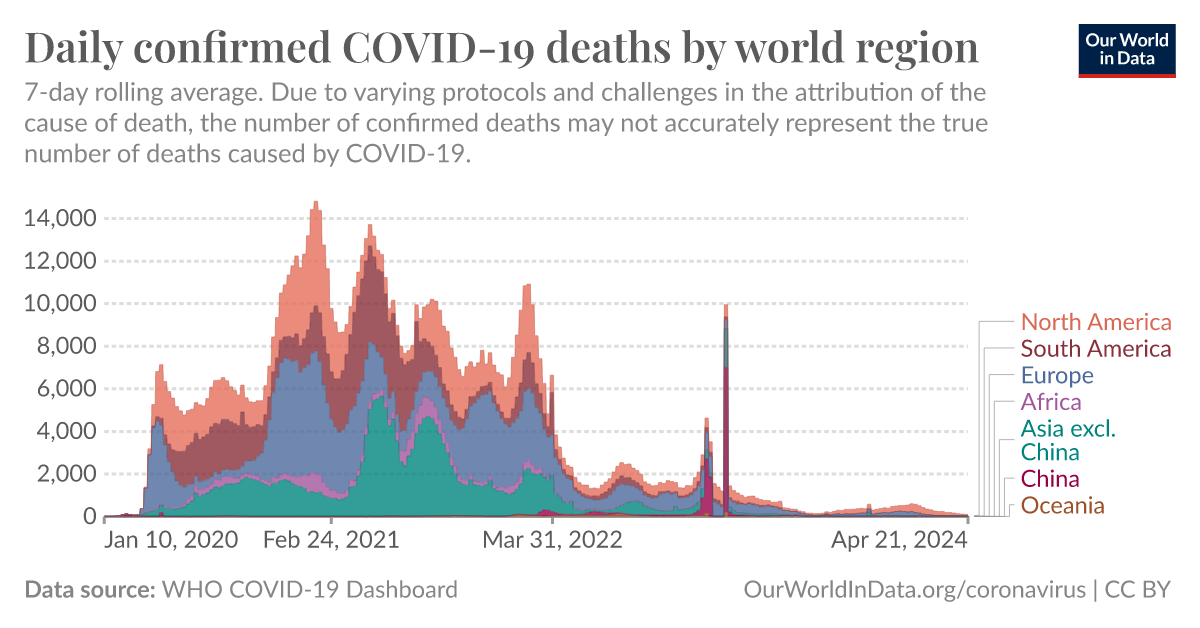
It was the most serious epidemic after AIDS, which has killed about 42 million, but in a far more longer time. But was no way close to the Spanish Flu of 1918, which killed multiple times more people when there were far fewer people around. And nothing compared to the Black Death.
So, I think that just shows our society is far more capable handling disasters than people before. Sorry, but I'm still optimistic here.
Just like these statistics... it's going to be more harder to get that nuclear winter now:
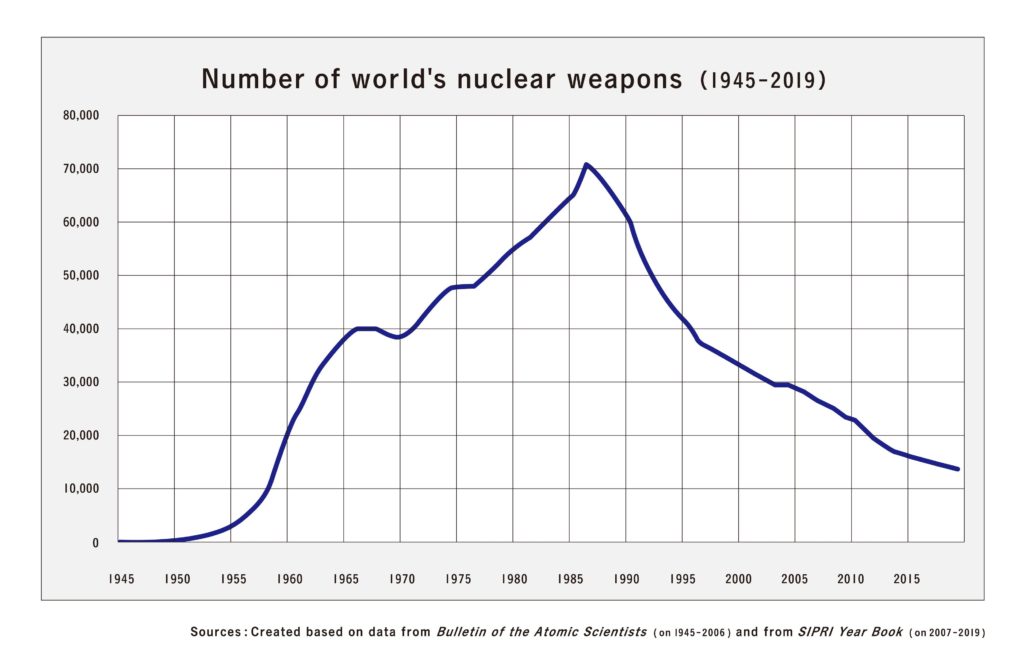
-
Israel killing civilians in Gaza and the West Bank
Overtime? Well, here will be the really huge problems, which will be quite important. After this the open air prison of Gaza cannot be just excluded like before. No outside force will likely come to Gaza. Or perhaps it might be a fig leaf of a UN mission, and when criminal gangs etc. rule the ruins of Gaza, it's going to be an example of how Palestinians cannot take care of themselves (or something like that). The question what happens next should be on the agenda, but it might not be.Over time Israel has become more cooperative on this — neomac
Hamas and Putin choose not to be Western, especially with all of it's decadent attention to human rights and democracy and the rights of peoples and minorities etc. Yet Israel isn't Hamas or Russia, but of course if they wish, they can go in that direction. Yet all the Israelis I've met are quite Western people and think of themselves as being West. They don't have the fear of their state as Russians do.More to the point, how would Hamas or Putin reason according to you if they were to choose? — neomac
Hence that's not the issue. The issue is how a Western country handles this situation. Does it try to solve something or is it just more about revenge. Or is it just about "mowing the lawn" until the next Palestinian uprising happens. There are many choices.
Well, then I hope you are never put to be an officer position in war, or basically given a rifle and fight in a war. Because it does make sense for me to treat a the enemy as I have been taught in the army: you shoot to kill an armed enemy (before he shoots you) and you don't shoot one that has surrendered or civilians. Your enemy doing that doesn't change what my country ask of me. It all starts from as obvious things like if you have to kill something, then kill it and don't torture it.To me it doesn’t make much sense to apply one standard when your enemies don’t play by the same standard. — neomac
Now I don't know what you really meant, but if you have an objection to the application of laws of war because of the actions of the enemy, that we have now, you are the problem if you will go to level as the enemy. So why on Earth didn't the Allies start exterminating all German men, women and children afterwards? Why not sent then the Germans to Auschwitz, since they had already built the infrastructure for industrialized genocide. Why apply them some other standard then and make them feel how untermenschen were treated, neomac? And afterwards, do you think Germany now (assuming you'd leave some spear) was as today?
And that's simply just Hollywood nonsense. Throwing to hell the laws of war doesn't help you, it helps your enemy and undermines your cause and justification.To me it doesn’t make much sense to apply one standard when your enemies don’t play by the same standard. It’s like boxing with a tied hand with somebody who can fight with both hands. — neomac
To take the laws of war seriously is important, because it's just an ignorant fallacy that they really would "tie you hands in boxing". You can kill and destroy the enemy quite well. And if you think the laws of war are a hindrance, well, then when having the boxing match just come there with shotgun and shoot your opponent full of lead until the bloody corpse doesn't move. He was such a loser in the first place just waiting for you with those boxing gloves on and thinking you would just try to hit him. As if there would be rules... sucker!
(and about boxing matches and using firearms...)
This is still a political problem, that needs a political solution. Or then the solution is just same thing over and over again. I personally don't see a political solution, but naturally (hopefully?) I'm wrong. -
Israel killing civilians in Gaza and the West Bank
Ok, I got mixed up, I thought you were referring to this below, which you weren't. Case cleared.That's why I didn't understand why you mentioned March/April 2022 in relation to the Israel-Palestine issue. — Tzeentch
Mabrlesheimer about Israel and Hamas conflict:
How he depicts Gaza is correct. He is also correct that the US isn't able to pressure Israel for a two state solution and Israel will never accept a two-state solution. Yes, that train has left the station. — ssu -
Israel killing civilians in Gaza and the West Bank
Have done it all the time when discussing events with you. :snicker:What's actually happening in the world? Enlighten us please. — Tzeentch -
Israel killing civilians in Gaza and the West Bank
Yep, and that's why you don't get what actually happens in the World.I view the European countries as little more than US vassals. What they do or think is generally irrelevant — Tzeentch
And so does John Marblesheimer. After all, who care about EU and the West European integration? Who care about the existing allies of the US?
The talk was about the two-state solution here. Did you watch the whole lecture? That the time for a two state solution has passed away a long time ago. And here I agree with Marblesheimer. The topic wasn't anymore about Ukraine, fyi.I'm not sure if I follow the link to the Israel-Palestine conflict, but what I'm referring to are the failed negotiations that took place. — Tzeentch -
Israel killing civilians in Gaza and the West Bank
Without the US, Russia has quite a say in Europe. Finlandization could come back as be trendy.I suppose one could hope anyway (all of Europe preferably). Expensive, though. The (present somewhat Stalin'esque) Kremlin looms large on the horizon. — jorndoe
And of course there is a new armaments program going on already in Europe. For example in Poland.
“The Polish army must be so powerful that it does not have to fight due to its strength alone,” said Polish Prime Minister Mateusz Morawiecki in November last year, as the country celebrated independence from the Soviet Union.
He promised that the country would have “the most powerful land forces in Europe.”
“We want peace, and if we want that we must prepare for war - in connection with that, we are strengthening the Polish Army in contrast to those who governed until 2015,” said Defence Minister Mariusz Błaszczak. -
Israel killing civilians in Gaza and the West Bank
Wrong.Putin has virtually for his entire time in power attempted to foster close ties with Europe. — Tzeentch
Putin at his start tried to foster close ties with Europe. On his terms, of course. And unlike many think, there were indeed those close ties. And a lot of work to renew those good ties, remember the reboot button? Even after the Russo-Georgian war, we have to remember. But then, he would have to had to make an economic recovery and give a lot of prosperity to the Russians, which he and his robber barons failed to give the people (even if oil prices rose). So on with Russia is an Empire card!
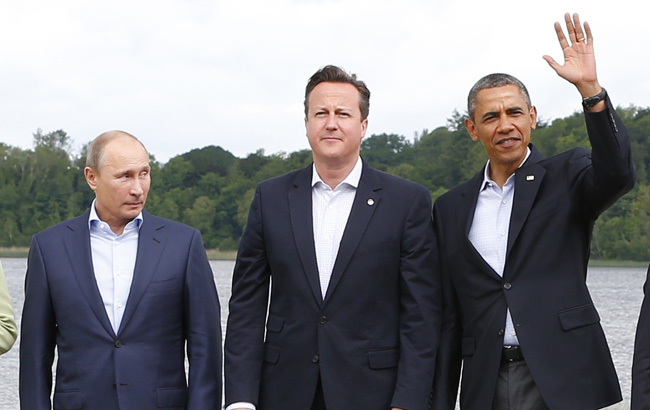
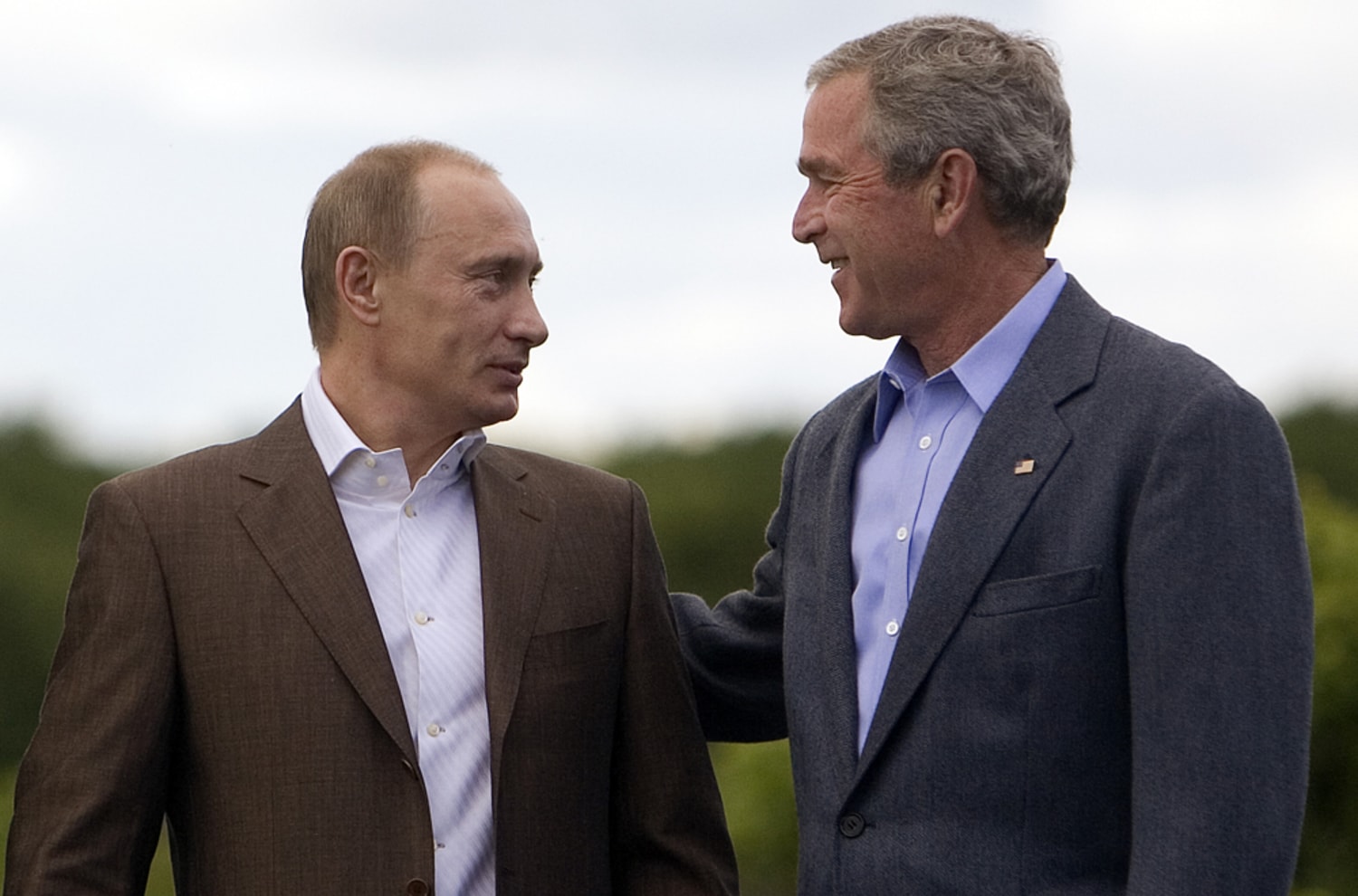
What happened in March/April 2022 with Israel and the Palestinians?I don't think that train left the station until March/April 2022, but now it certainly has and the Russia-China alliance is a fact of life. — Tzeentch
That's true! Darn, forgot about that.Mearsheimer wrote a book together with Stephen Walt, and gave many lectures about the US Israel lobby. — Tzeentch -
Ukraine CrisisPositive? Hmm.. :chin:
(Ukrainska Pravda, 30th Oct 2023) Sergey Shoigu, Russia's Minister of Defence, claimed that his country is ready for political discussions about "post-conflict regulation concerning Ukraine" and "further co-existence with the West".
Might be something in the air... -
Israel killing civilians in Gaza and the West BankSeems like John has lost his marbles, or simply gets his money from Putin nowdays: the idea of Russia being an ally of the against China is totally delusional idea now. You would have to had stupendous politicians in the past, not the mediocre ones, to have US and Russia as allies immediately when the Soviet Union collapsed. Then was the opening. That closed during the Kosovo war. Only way for this to happen would be a revolution in Russia where liberal-democratic forces would prevail. Not with the present KGB officer at the helm.
And, as this is John Lost-his-Marblesheimer, for him there's only United States, China, and Russia. Period. Nothing else in the World and his theories.
Of course, Marblesheimer, as a typical American thinking only as the US from the perspective of me, myself and I, totally sidelines that the actual working and effective alliance it has NATO and NATO countries like France, Germany, the UK and others. If and when they come along with the US, that the actual Superpower juggernaut, because these countries can work together and are totally happy with the US being at the helm. There is absolutely NOTHING like it in Asia where the US according to John (and the US establishment, it should be noted) wants the US to pivot. There is no SEATO. There is only bilateral agreements with countries and some vague speaking clubs.
Hence if "pivoting to Asia" would literally mean forgetting Europe, then NATO would go the same way as the other treaty organizations like CENTO and SEATO. And Western Europe would create it's defense towards Russia without the US. This actually has been already been discussed for example in the British Parliament when Trump put out his most eccentric tweets.
And the US pushing NATO states down throat of Russia? Again, the idea of those NATO states pushing for membership doesn't come to Marblesheimer's head. Again, anyone or any country other than the three big military one's are totally meaningless. At 11:54 he again forgets that the US isn't handling satellite states like Stalin did with NATO members and Ukraine or Georgia coming to join isn't just what an US President wants. That Sweden isn't yet in NATO shows this clearly. Only ignorant people think of NATO as a puppet of the US.
On the Ukraine war, at least he is correct that it's a war of attrition, and about the importance of artillery (it's still the king of battle). Also that it will end up as a frozen conflict is probable.
Mabrlesheimer about Israel and Hamas conflict:
How he depicts Gaza is correct. He is also correct that the US isn't able to pressure Israel for a two state solution and Israel will never accept a two-state solution. Yes, that train has left the station. Just why is the US so close to Israel isn't explained. Actually John makes a mistake claiming that the carrier group shot down cruise missiles. That didn't happened, another US Navy destroyer Carney shot down them from the Red Sea, as anything shot from Yemen towards Israel is a bit difficult to shoot down when sailing in the Mediterranean.
Geographical mistakes can happen to old men.

-
Israel killing civilians in Gaza and the West BankTo continue, the real issue here is what Israel really will do afterwards, if it wants to wipe out Hamas altogether. Again the lessons learned from the US experience in Iraq (in Fallujah) tells how crucial this is:
In Fallujah the US did have the Iraqi government to help here (and whose performance wasn't stellar), but who has Bibi? So what to do with the human animals from the evil city?The transition from combat operations to restoration of essential services and humanitarian assistance was envisioned to be spatial not time based. In other words while fighting was continuing in some areas of the city, where possible MNF and Iraqi forces would be rebuilding pump houses and electrical substations in an area not far away, and in other location within the city military forces would also be providing humanitarian relief supplies to the remaining Fallujah residents.
In practice, this conditions-based conflict termination process worked rather well, but it did suffer from some significant challenges.
Perhaps the US will come to mop around and clean the place or something... -
Israel killing civilians in Gaza and the West Bank
From the article you posted:
Proportionality as a principle is a manifestation of the law of war’s delicate balance between the military imperative of defeating the enemy as quickly as possible and the humanitarian imperative of mitigating suffering during war as much as possible. Parties to a conflict must not only refrain from attacking civilians and civilian objects deliberately, but they must also make extensive efforts to minimize the incidental harm from their attacks on lawful military targets.
Now how do you do that? Well, here's one example what US armed forces did before capturing an Iraqi city held by insurgents in Operation Phantom Fury:
Less than one thousand civilians were killed then in Fallujah (800 according to the Red Cross/Crescent). Meaning if there were only 30000 left in the city, roughly three people of every one hundred civilians died in the battle at worst. That would be to Gaza's size 58 000 killed, if or when the civilians cannot get out from the fighting. Assuming the IDF would show similar restraint as the US did in Fallujah.Most of Fallujah's civilian population fled the city before the battle, which greatly reduced the potential for noncombatant casualties. U.S. military officials estimated that 70–90% of the 300,000 civilians in the city fled before the attack, leaving 30,000 to 90,000 civilians still in the city.
And you might say Israel has done the same thing here by telling the people to leave Gaza City and seek refuge in the south. Now it seems that Gaza has been cut and the focus is on Gaza City. Sounds OK, but then not giving minimal humanitarian aid to over two million people is one troubling issue. Then comes the question what to do to the southern part. How Israel will conduct the war when it comes to the southern part of the Gaza strip is the real breaker here. Civilians supposed to have gone there(in 48 hours), yet it has also has been bombed. How to clear that, what to do there, is where you can easily get into tens of thousands of killed. The battle of Berlin cost the deaths of 125 000. The real questions here are the "then what?", what you do after you have gone through the small strip of land.
If the human toll will become huge, the propaganda spinmeisters will have a lot of work (on both sides) and will try to make it disputed. However you cannot make tens of thousands killed somehow be living, hence history will have a somewhat exact figure. -
Israel killing civilians in Gaza and the West Bank
Uh, just where do you think people of Gaza have been living after 1967? Did they live under the same laws as Israelis? No. Have they had the same rights as Jewish Israelis? No.That's true, but it doesn't nearly go far enough. If Gazans surrendered, they would not only have peace, but if they let foreigners rule over them, rewrite their laws, and build their institutions, they would achieve a level of prosperity that would've been unthinkable before. — Chisholm
They have been living under foreign rule that has rewritten the laws (from Egyptian or Jordanese law).
Wouldn't they be actually on the same spot as they were earlier, if they surrendered? -
Israel killing civilians in Gaza and the West Bank
At least Azeris are happy, they got the Nagorno-Karabakh to themselves and the Armenians there are fleeing (or have left) the place. That conflict is resolved.Look at all the other conflicts- Yemen for example, or Sudan. Azerbaijan. What is happening there? — FreeEmotion
The support of American Evangelicals of Israel one of the most ludicrous things in present politics. For them Israel isn't an ordinary state, it's something nearly divine.I must say I am rather surprised and disappointed that those supporting the "Evangelicals" are so very unscrupulous. — FreeEmotion
So it seems. Yet I think the question is how Israel defends itself. Is there a legitimate question about using excessive force? I think there is. Is it when 10 000 Palestinian civilians killed? Or 50 000? Or 100 000 out of 2,2 million? Would over 100 000 dead be excessive? Already Israel has made more strikes than the US did in one year in the war in Afghanistan.
But you are correct that we didn't have a similar debate about the Russian strategy of bombing hospitals and civilian targets. Yet as of September 2023, the UN has reported that 9 614 civilians have been killed and Ukrainian officials say about 11 000 are missing.
Urban combat is dangerous for civilians, especially there's not much restrictions on using artillery.The largest number of deaths was recorded in March 2022 - more than 3,900 - when Russian troops occupied part of Kyiv region and advanced towards the capital.
And as Gaza was basically totally dependent of Israel for water etc, the population is in danger. And if during peacetime Gaza recieved daily 500 trucks with supplies and now it has gotten 80 after October 7th, it's no surprise that people are looting UN warehouses. -
War & MurderWe usually have this difficulty of seeing someone or especially a country as both perpetrators and victims. For many, for some reason, it is very troubling when someone points out warcrimes or other dubious actions in an otherwise justified military action. This is because those who are typically pushing their own agenda will try to diminish the justification by pointing out the negative aspects. Yet the reality is what it is.
But then I come from a country where our Jews fought alongside Nazi Germany against Soviet Union. A country that defended itself alone against an invasion, but then was quite happy to try to gain more land when another brutal dictator attacked the previous brutal dictator that had attack us. In the end got it's ass kicked, but survived.
(A field synagogue on the front during the Continuation War in Syväri, actually very close to the German positions, who then were our brothers in arms. 4 Finnish-Jewish soldiers were given the Iron Cross, none of the accepted it.)
In fact, I had the honor of knowing one of such Finnish-Jewish war veteran, an anti-aircraft artillery reserve officer, who died at the age of 96 in 2014. He had a wonderful positive attitude towards life and was a true gentleman. I didn't believe first he had seen action on the front as nice and full of life he was (as war veterans often have emotional scars), but actually he had been wounded in combat. And he lived quite an remarkable life! -
Israel killing civilians in Gaza and the West Bank
And in which religion murder wouldn't be a sin? Those religions with human sacrifices have dissappeared, and even they didn't that you can randomly murder anyone. You can have individuals, groups organizations and states that are murderous, not whole people.Jews are not a murderous people. Murder is the primeval sin in our religious texts; Judaism is also a much older religion than Islam. The ultra-orthodox have been disliked for years by their fellow Israeli Jews for a myriad of reasons. — BitconnectCarlos
I wouldn't say that. The EU is quite divided in this issue and for example France and Macron don't share the views of the US. Erdogan is so mad that Israel is withdrawing diplomats because of his comments. And Hamas has achieved at least one objective, the halting of the normalization of relations between Israel and Saudi-Arabia. The Palestinians are back in the center of focus.Neither Nettanyahus extreme right wing Zionist government cares about the Gaza, it would seem, no-one cares. — FreeEmotion
Hence actually, so many care that this war might escalate. -
Israel killing civilians in Gaza and the West Bank
Just two aircraft carriers is rare and basically a two carrier battle group is a wartime deployment. Four would basically mean all possible carriers out of the eleven, because with a rule of thumb one third is on repairs and fitting out... in peacetime.Reports are that four US carrier groups are headed to the eastern Mediterranean and Red Sea. That's a massive deployment, likely not meant to scare small fish like Hamas or Hezbollah, and probably offensive in nature.
But time will tell. — Tzeentch
(Situation of the USN major surface combatants at sea, October 16th, 2023)

Notable is that along the lines of US and Israel, the only other US allies that joined being against were Czechia, Croatia and Hungary. The majority abstained and France voted in favour.Also, yesterday a resolution was adopted by the UN General Assembly calling for an “immediate, durable and sustained humanitarian truce leading to a cessation of hostilities.” — Tzeentch
I think the actual leadership is now committed to the fighting in Gaza. Of course the "representatives" in the Gulf States are there to hold up the flag especially if the present cadre is wiped out in Gaza.Meanwhile the senior leadership of Hamas resides in relative luxury in hotels in Qatar, as well as in Lebanon, Turkey and other safe spaces well away from the conflict zone. — Wayfarer
A sober assesment of the situation from UN's Navi Pillay, Chair of the UN Independent International Commission of Inquiry on the Occupied Palestinian Territory. Naturally she sees both sides clearly committing warcrimes. Not surprising that the US or Israel disregards her position of having any authority. That she heads this kind of Independent Comission isn't even written her Wikipedia page, which writes like she has retired this decade. Very typical in the way persons like her are kept out of the public view.
She, as an South-African, when asked about the Apartheid-nature of the occupation agrees on it, but points out that it has only happened because of the occupation.
-
War & MurderIf the real intent is to kill civilians, then both are morally equivalent.
Yet armament factories ought not to be in the same place where civilians live. As usually intelligence is scarce and likely wrong, naturally many "civilian" targets can be judged to be "military" targets. And many what is basically civilian infrastructure is also military target, when the enemy uses them: train stations, bridges, harbours etc. Some (not me) will argue that Hiroshima was a military target.
From the perpetrators side it's the age old question, is there a difference with the soldier that kills with a bayonet or a soldier that fires an artillery gun never knowing who it hits? Artillery kills the most in wars, still even today, but usually we don't hate the artillerymen for being murderous mass killers.

-
Israel killing civilians in Gaza and the West Bank
Thanks for the correction, I'm not so familiar with different sects of Israel.As far as I am aware, the majority of settlers are regular Orthodox Jews. The ultra-orthodox Haredi have largely (but not always) opposed settling on the West Bank due to their anti-Zionist stances. — Tzeentch
As now the US has retaliated on attacks on it's forces by attacking the Revolutionary Guard in Lebanon, but also de facto defended Israel from a possible drone from the Houthis with the USS Carney shooting down 15 drones and four cruise missiles, I think the possibility for the conflict to escalate is actually high.
(US Navy defending Israel on the Red Sea)
And the land assault hasn't started yet, only with probing attacks.
Doesn't look good. Hopefully both Iran and the US can keep their cool. And minimize it to slaps on the wrist. -
Israel killing civilians in Gaza and the West BankSo US has now made strike into two bases in Syria used by Iranian Revolutionary Guard.
WASHINGTON (AP) — U.S. fighter jets launched airstrikes early Friday on two locations in eastern Syria linked to Iran’s Revolutionary Guard Corps, the Pentagon said, in retaliation for a slew of drone and missile attacks against U.S. bases and personnel in the region that began early last week. -
Artificial intelligence
I would dare to say that simply using google or any search engine is similar use of "augmented" intelligence.I signed up for ChatGPT the day it came out, used it every day since. It’s quite amazingly useful. i say the ‘A’ in AI stands for ‘augmented’ rather than ‘artificial’. — Wayfarer
I still wouldn't think either search engines or ChatGPT mean machines are taking us over. -
Israel killing civilians in Gaza and the West Bank
Especially when these it's these people that then the IDF has to safeguard in the occupied territories.The ultra-orthodox even protest against the existence of the state of Israel, because they believe it is claiming the land that belongs to God.
You can find images of them burning Israeli flags during protests and things like that.
I thought that was very interesting. — Tzeentch
I remember a great French documentary about the first Israeli soldier killed in Gaza and the first Palestinian fighter killed in Gaza. The brothers in arms of the fallen Israeli soldier remember him bitching about why they have to be there safeguarding few ultra-orthodox settlers. (The interview with the Palestinian family was also telling: the mother was extremely proud that her son was a martyr and when the little sister started to cry during the filming, the mother scolded her and told his brother was in heaven and she should be proud to have had a martyr as a brother)

-
Future Generations Will Condemn The Meat Industry As We Condemn Slavery
No, actually it comes down to my example of why reindeer meat is so far much healthier having less fat and many vitamins etc. than any domesticated animal: it eats 350 different plants and roams free basically all it's life in the wilderness. Just ask yourself: do any farm animals get 350 different plants to eat and get the physical exercise that reindeer gets roaming the forests and tundra? No, absolutely not. With lab meat this is even more obvious as the chemist has to add every ingredient to the lab meat. Great! There might not be any toxins, so yes, it's not going to be dangerous, but simply the present knowledge of how things are healthy is limited.My understanding was that it would be less risky health-wise to eat meat from a lab, but it seems like you're mostly referring to the problem of obesity, is that right? — Judaka
Hence lab meat is pinnacle of processed food, which does have it's defects. Already the monotone feeding of domesticated animals has had a huge impact on the taste and nutritiousness of meat. Lab meat and how healthy it is to eat only lab meat puts this on another level. This too is apparent from plants that are a) grown in greenhouses, b) grown on farmland and c) are wild. The differences in taste are obvious. -
Israel killing civilians in Gaza and the West Bank
Fortunately the Jewish religious zealots aren't so deadly towards Christians as the Muslim religious zealots are towards them in many other Middle Eastern countries. And it's now a bit ironic that the ultra-orthodox protested against their military service.Christians have been traditionally well treated in Israel, but sadly there has been an uptick in anti-Christian activity lately. It seems to mostly come from the ultra-orthodox. Very sad, but many Jews are unlikely to be sympathetic due to centuries of Christian anti-Semitism. — BitconnectCarlos

-
Future Generations Will Condemn The Meat Industry As We Condemn Slavery
How on Earth would it be so? The world has very few native wild herbivore compared to domesticated animals. And above all, why would you need reindeer for everyone???As there are not enough reindeer for everyone, I suppose all the native wild herbivores of every continent will have to be domesticated, herded and eaten. — Vera Mont
Again, there's a simple question of supply and demand. There's only so many reindeer in Europe (roughly about 2 million). Yet also there's only so few who do eat reindeer. The vast majority haven't eaten reindeer, as likely haven't eaten other so-called exotic animals.
Then again, for every New Zealander there are 25 sheep, which earlier was a ration of one to forty. In all, there are about 1,2 billion sheep in the world. There's also about 1 billion to 1,5 billion cows.
Now if lab meat becomes one tenth of the price that animal husbandry costs, what simply will happen that there aren't anymore those sheep in New Zealand around. Some who prefer to eat a "classic" diet will have that available, but have to pay a higher cost. Those that don't care what they eat, as long as it's cheap and "good", will then eat what the industry provides them. If it's artificial lab meat, so be it.
Many find the industrial scale distasteful. Yet I think it's also more about the fact that people simply have lost the connection to animal husbandry as fewer and fewer people are living on a farm with animals. Urbanized people simply don't have the way to live off the land. Everything you eat you buy. And that's a problem: many don't go a pick berries or mushrooms, fewer go fishing or hunt.Some people might still find the process distasteful. — Vera Mont -
Future Generations Will Condemn The Meat Industry As We Condemn Slavery
I think that has seriosly been taken place for well over 150 years.Automation has been slowly taking the place of human labor for at least 50 years — frank -
Israel killing civilians in Gaza and the West Bank
Some Christians might be OK in Israel, I guess. Assuming that they know their place...I don't see where the Likud platform says that Israel must be entirely Jewish. — BitconnectCarlos
-
Future Generations Will Condemn The Meat Industry As We Condemn Slavery
Yeah, once lab meat costs one tenth of the meat traditionally produced by animal husbandry, you know what you will be eating in a BigMac at McDonalds.Right, I'm more-or-less making the same case as this, that seeing this sort of possibility on the horizon is the pre-requisite for condemning the meat industry as it exists today. — Judaka
And what I fear are health problems of what use of lab meat will have. They'll perhaps add something like C-vitamin or whatever, but usually the "production by the cheapest method" will have severe effects, because it can go to that. Poverty today isn't shown that one's starving to death, it's that people are obese with lack of exercise and healthy diet, that then is very expensive. The simple fact is that it's too costly and perhaps far too difficult to mimic wild flora and fauna in industrial production.
You can already notice the vast difference of industrial meat production, for which something the soy is given to eat and compare it with something that is wild. Here in Finland reindeer meat is the perfect example: reindeer has a lot more vitamins, far less fat and is overall far more healthier than cow, pork or chicken. The reindeer lives all it's life in a pack eating well about 350 different plants depending on the season. And it migrates large distances. Hence for a person that has eaten hamburgers and chicken nuggets all his or her life, the taste will likely be too strong and likely the meat will be chewy as reindeers get a lot of exercise all their life.
The 200 000 reindeer here in my country are owned about 4 000 owners and they are an example of a species that has been on intent left half wild and half domesticated. There are no "wild" reindeer in Finland. The change from hunting to reindeer herding happened in the early Middle Ages and has continued from the on.
(Which ones are mine? In a reindeer roundup the animals are divided to their owners as adults are marked. As the young fawn follow their mothers, the herders do know just who owns them.)

I'm not seeing any reason why reindeer herding would stop for some reason. Human species is an omnivore and not a vegan. And just like reindeer herding, animal husbandry something that we can do quite ecologically (as 1000 years of reindeer herding shows).
However if the economies don't create prosperity and more people would start to fall into poverty, some cheap alternatives like "lab meat". And if/when the authorities responsible for food safety are controlled by large corporations, perhaps that "lab meat" will be sold as ecological produced.

-
Israel killing civilians in Gaza and the West Bank
Actually, this isn't only limited to your favorite country that you hang around in. For example the Swedish government is worried about the rising anti-semitism and the Swedish media reported the similar chant in protests in Stockholm. And the Germans too have zero-tolerance for such disgusting anti-semitic hate speech.Dutch politics is pathetic. Ridiculous virtue signaling. — Benkei
Of course, people protesting for Palestine, someone using such a chant and someone throwing molotov-cocktails in a synagogue are naturally put together. Because, why not?
Which just reminds me how great the already here mentioned exchange between Piers Morgan and the Egyptian comedian Bassem Youssef was. If someone hasn't yet seen it, I encourage to view it or listen to it.
-
Future Generations Will Condemn The Meat Industry As We Condemn Slavery
Well, if we make a simple extrapolation from the present how now "woke" society condemns history, It may be possible for these kind of attitudes will come more frequent.I don't know when it will happen, but I'm fairly confident that, at some point, the tides will turn against the meat industry in the same way they did for slavery. — Judaka
But I doubt the reasons will be due to people changing for moral reasons. If it happens, it's because a transformation of the meat industry itself.
The reason would be simply changes in the technology used by the food industry, which could result in the alienation of people from eating what they have been eating since humans walked on this Earth. Yes, that's possible, but in no way is it something to rejoice as us being more ethical. On the contrary, likely the "don't murder animals and eat them" stance will likely be a shrewd marketing ploy of the new food industry. Who better to promote the "animal meat is murder" than the industry manufacturing non-animal non-sentient "lab meat" at a cheap cost in huge industrial size "laboratories"?
The only way I see it that simply fabricated food, grown from cells etc., will become so cheap that animal husbandry simply can't compete with the new genetical produced lab meat. Then it can happen. That's the unfortunate reason why this would happen, because the ethical question of eating or not meat have been around for millennia.
Lab grown meat. The future for us?
And even this won't make animal meat to be banned. Just as we can have forestry for many hundreds of years without ever the forests been all cut down, so will even eating wild game prevail. Hence there's the demand and supply, why would it change? Our link to nature and especially living off from nature is changing: how many can still eat for example the berries and mushrooms you can pick from the forest? At least here in Finland I don't see that changing. Yet the fact is that many people who aren't vegetarians have not and will not ever taste how strong actual wild animal taste, but only know the industrially produced soy-eating animals. The alienation from the wild will surely continue. -
Israel killing civilians in Gaza and the West Bank
I think duels were usually not looked well upon. Totally different from how fighting well in war is respected.I find it interesting that killing an armed person in uniform in cold blood is somehow acceptable. Its curious. Is there some gentleman's agreement to kill or be killed, sounds macabre. Duels were once legal. — FreeEmotion
But yes, war and warfare is one of the really crazy things that our societies have created. The monopoly of violence of the state in our society has comes close to this when you think about it, but warfare is really something spectacular compared to legal violence. Military men aren't psychopaths, but quite logical normal people. How we can compartmentalize issues is simply incredible.
And it's telling that in many ways we have become in many occasions far more savage again than earlier. As late as the 19th Century things were different.
(And then it's over. Russian and Finnish officers meeting after the armstice between the two countries in 1944. Note that here the Finns aren't surrendering, peace agreement was made later, yet the Finland and it's army are basically the same as before WW2 even having been on the losing side.)

In fact, the last war where both sides did extensively follow the laws of war was in the Falklands war. Either side didn't act war crimes. The only civilians killed during the Falklands war were three women who were killed when a Royal Navy shell hit the house they were sheltering in during a naval bombardment of military targets inside Stanley itself. That's not a war crime, that is what is stated to be collateral damage. The only accusations were made by Argentinians against Argentinian officers against their handling of their troops, which the Argentine court didn't see as crimes against humanity as the Argentinian military law did allow the harsh measures. -
Israel killing civilians in Gaza and the West Bank
Umm, actually ISIL and Tamil Tigers actually were destroyed. There was no "peace deal" with them in the end.History is replete with peace deals with the most vile dictators, terrorists (didn't we just hands Afghanistan back?) and belligerents. The idea peace isn't possible with Hamas is just a narrative people lap up because it's repeated ad nauseum and it's obvious bullshit. See: ISIL, IRA, ETA and Tamil Tigers. — Benkei
Of the end of the Tamil Tigers:
The Jaffna Peninsula was captured by the Sri Lankan Army by 14 January. On 25 January 2009, SLA troops "completely captured" Mullaitivu town, the last major LTTE stronghold.
President Mahinda Rajapaksa declared military victory over the Tamil Tigers on 16 May 2009, after 26 years of conflict. The rebels offered to lay down their weapons in return for a guarantee of safety. On 17 May 2009, LTTE's head of the Department of International Relations, Selvarasa Pathmanathan conceded defeat, saying in an email statement, "this battle has reached its bitter end".
With ISIL/ISIS/IS it was basically the same. Of course anyone can pick up the crazy franchise again...hence the IS can naturally pop up again. Perhaps like Hamas can after its possible destruction, assuming it puts up a heroic fight in the eyes of the next generations of Palestinians.
Many terrorist organizations and independence movements do have met their end without a recognized peace deal. -
Israel killing civilians in Gaza and the West Bank
Sorry, but to kill over 1400 civilians, you really have to make the effort. It's not just civilians getting into crossfire and a conditional that "some may have".I think some of the Hamas fighters (some in civilian clothes as you can see) and other 'volunteers' may have crossed the fence and with the same spirit of revenge that is in the air today, may have attacked and killed civilians. Also, some civilians may have been killed in the crossfire. — FreeEmotion
No one is protesting Israel killing Hamas fighters either, but typically killing families of soldiers is a war crime, assuming not everybody in the family is part of the military.Notice no-one is protesting the killing of Israeli soldiers, some off-duty, and when a Hamas leader is killed along with his family, that is alright, but if an Israeli soldier is killed along with his family it is a horrific atrocity. — FreeEmotion
Yes, but that was some time ago when Israel thought it was a great "divide and conquer" strategy to have PA and Hamas fighting each other. Yet that is history now.The stated goal of Hamas is not peace, or a two-state solution. For some reason Israel propped them up, in their wisdom. — FreeEmotion -
Israel killing civilians in Gaza and the West Bank
And do you believe that Netanyahu has really a "strategic plan for a two state solution"? I think his strategic plan is to talk about a two state solution (to keep Americans happy) and make sure it never happens. This is the plan: destroy the terrorists.They need to actually have a strategic plan for a two state solution and work to bolster the moderate Palestinians. — schopenhauer1
It's like the EU having talks with Turkey (or whatever the name given to the state by Erdogan) about a "possible" EU membership for the country. Because the EU will never declare membership being out of the question...
ssu

Start FollowingSend a Message
- Other sites we like
- Social media
- Terms of Service
- Sign In
- Created with PlushForums
- © 2026 The Philosophy Forum



